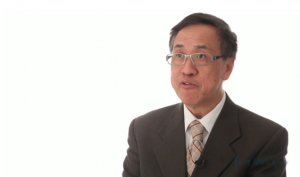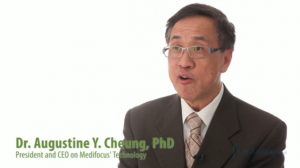Dr. Cheung Explains Focused Heat Treatment for Cancer
In a recent video, Dr. Augustine Y. Cheung, president and CEO of Medifocus Inc., explains the focus of his company on tumor treatment.
Medifocus Inc. develops and commercializes minimally invasive treatment systems for malignant and benign tumors, specifically in breast and prostate cancers. The Adaptive Phased Array (APA)-1000 precisely focuses and controls microwave energy to shrink breast cancer tumors without side-effects. For prostate cancer, the Prolieve® System is based on endo-thermotherapy that dilates the prostatic urethra and heats the prostate.
Cheung says his vision is to be able to use focus heat treatment to target malignant and benign tumors in order to restore patients to full health.
“The reason is that focus heat treatment does not have side effects. It does not have cumulative toxicity, light radiation, or chemotherapy. By working with MIT Lincoln Laboratory, we have an adaptive phased array focus heat technology that will allow us to focus heat only where the tumor is and spare the normal tissue.”
He says that the vision is to be able to make multiple systems available for various parts of the body in order to provide innovative treatment to restore health to all cancer patients.
Before Medifocus Inc., Cheung founded Celsion Corporation in the United States and was a professor at the University of Maryland. He is a well-known microwave expert and has raised significant capital for Celsion. He received a PhD in Electrical Engineering from the University of Maryland.
Prolieve Offers 45-Minute Procedure for BPH Relief
 In a recent video interview with Bob Giordano, President and CEO of Medifocus Dr. Augustine Y. Cheung explains how his Prolieve BPH Treatment works.
In a recent video interview with Bob Giordano, President and CEO of Medifocus Dr. Augustine Y. Cheung explains how his Prolieve BPH Treatment works.
Bob Giordano is a Principal at Launchpad IR. He has worked in the financial services industry for 35 years and was originally trained to be a lawyer. He worked with investor relations, focusing on emerging small cap mineral resource and life sciences companies.
Benign Prostatic Hyperplasia (BPH) is a non-cancerous urological disease in which the prostate (a walnut-sized gland that preserves and transports seminal fluid and sperm) enlarges and constricts around the urethra and restricts the passage of urine. This frequently enlarges with age, and the resulting restriction requires the patient to exert excessive pressure on the bladder in order to urinate. The inability to urinate properly typically results in bladder infections and/or kidney damage.
In the video, Cheung says that he wants to use the Prolieve device for cancer, such as prostate cancer, in addition to BPH. He explains that Prolieve is more beneficial than the use of drugs, surgery, or microwave treatment that swells cells. Prolieve uses heat and pressure from a dilation balloon to expand the urethra, which creates an effect like ironing.
He says:
“The combination of heating plus pressure, which is generated by the dilation balloon, creates what we call an effect that is like ironing. You know, you use pressure and heat to stiffen out a wrinkled shirt, right? Same kind of thing—it will stiffen out the urethra’s lining so that the urethra actually gets open and then stays open. We have created what we call a biological stand, so that you can keep this remaining open for several weeks to over months, to allow the patient the pleasure of not having to wear [a] drain tube and still get the better part of the microwave heating…”
Cheung states that this procedure is far superior than the other BPH technologies because of the “biological stand.” He explains that Medifocus has worked on 60,000 patients and has an agreement with the Federal Drug Administration to conduct a five-year study. Every patient is happy, and there are no side effects after the procedure.
Cheung explains that the procedure is not burdensome. Patients are able to undergo treatment in a 45-minute office procedure and do not need surgery or anesthesia. The procedure includes local anesthesia and the insertion of a catheter and people can easily leave afterward.
He says:
“The insertion of the catheter into the urethra takes five minutes [and] treatment [takes] a half an hour. The total procedure time [is] 45 minutes. After 45 minutes, the patients don’t wear a urine catheter and they don’t have any side effects because of no sedation. They go home. So that is unlike any other thing.”
Watch the full video below.
Cheung founded and was the CEO of Celsion Corporation. He is a well-known microwave expert and was also a professor at the University of Maryland, where he received a PhD in Electrical Engineering. He successfully developed devices and pharmaceuticals for a tumor targeting cancer treatment that uses multiple focused heat.
Dr. Augustine Y. Cheung Explains Medifocus’ APA-1000 System in a New Video Interview
 A recent video interview with Augustine Y. Cheung, PhD, President and CEO of Medifocus, explains how the company’s technology can help women with breast cancer. By offering targeted heat treatment for breast cancer, Medifocus’ technology can shrink tumors up to 8 cm in size to small enough to be removed with a lumpectomy. The equipment, known as the Adaptive Phased Array (APA)-1000 system, has received regulatory approvals from the FDA to conduct the Phase III trials necessary for marketing the system.
A recent video interview with Augustine Y. Cheung, PhD, President and CEO of Medifocus, explains how the company’s technology can help women with breast cancer. By offering targeted heat treatment for breast cancer, Medifocus’ technology can shrink tumors up to 8 cm in size to small enough to be removed with a lumpectomy. The equipment, known as the Adaptive Phased Array (APA)-1000 system, has received regulatory approvals from the FDA to conduct the Phase III trials necessary for marketing the system.
A lumpectomy represents a better chance for a woman to keep her breasts over a full or partial mastectomy, which removes most of or even all of the breast tissue in order to keep the cancer from spreading. As Dr. Cheung says, “The majority of women after careful consideration still elect to have total breast removal because they don’t want to compromise their life by waiting, postponing the surgery.” Medifocus’ technology may give women an alternative to full mastectomies when they’re struggling with breast cancer.
According to Dr. Cheung, ““We can shrink the tumor size an additional 50% over treatment with neoadjuvant chemotherapy alone.” He says that women who use Medifocus’ heat targeting technology have a better than 90% chance to get a lumpectomy instead of a mastectomy, as shown in Phase II trials. This is an significant improvement over neoadjuvant chemotherapy’s 22% success rate .
Dr. Cheung is an internationally-known microwave expert. He has presented papers globally and taught at the University of Maryland. He has developed multiple focused heat based tumor targeting cancer treatment devices and pharmaceuticals. He has a PhD in Electrical Engineering from the University of Maryland.




